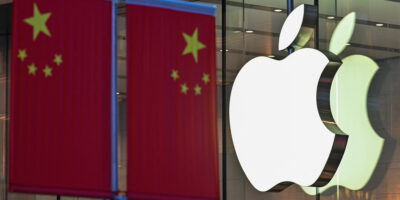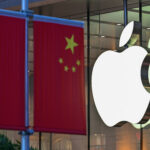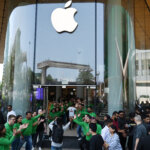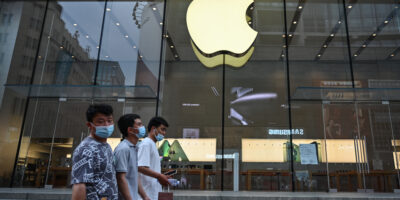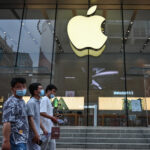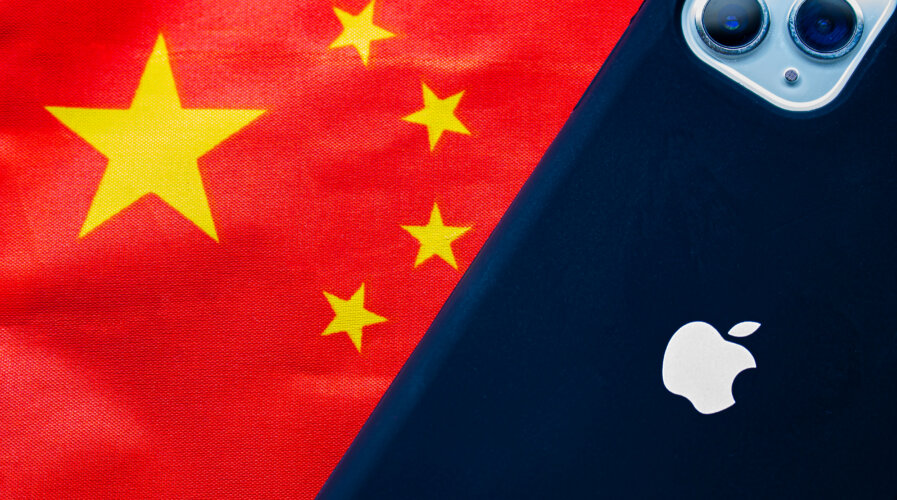
China has expanded bans on using Apple’s iPhones and other foreign smartphones in government buildings or work. Source: Shutterstock
First Teslas, now iPhones. China is restricting government officials from more US tech
- China has expanded its ban on using Apple’s iPhones and other foreign smartphones in government buildings or for work.
- The move, a blow to Apple, comes after military and government personnel were barred from using Tesla vehicles.
- If the ban is extended, as seems possible, it could harden the trade war between the U.S. and China.
It was March 2021 when reports surfaced that China had prohibited people working for the military, government agencies, and “state-owned enterprises in sensitive industries” from driving Teslas. The move stemmed from fears that Tesla’s exterior cameras could capture sensitive information and share it with the U.S.
Now, the Chinese government is swinging its foreign tech ban hammer in the direction of the U.S. again, this time targeting smartphones, including iPhones.
According to The Wall Street Journal (WSJ), the Chinese government has banned officials at central government agencies from bringing foreign-branded phones, including iPhones, into offices or using them for government work. Citing unnamed sources, the article states that China seeks to “cut the country’s reliance on foreign technology,” beef up cybersecurity, and prevent sensitive data from leaking to foreign governments.
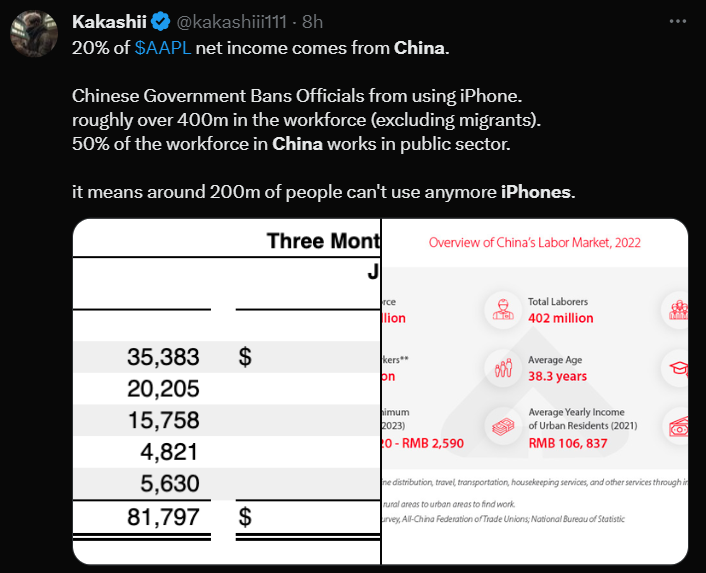
Is China looking to keep its secrets safe by banning iPhones? And if so, surely it can’t be blamed. Source: Twitter
The move by China is not surprising and is, in fact, considered a tit-for-tat following the U.S.’s “rip and replace” bans on Huawei and ZTE hardware and its ever-expanding attempts to ban TikTok at local, state, and federal levels. The U.S. even recently broadened restrictions on the export of high-performance artificial intelligence chips by Nvidia and Advanced Micro Devices (AMD).
In the last two years, tensions between the U.S. and China have intensified. Washington has actively worked with allies to block Chinese access to vital equipment needed to keep its chip industry competitive. Beijing has not stayed put either and has proceeded to restrict shipments from prominent U.S. firms, including plane maker Boeing and chip company Micron Technology.
Beijing also ordered central government agencies and state-backed corporations in 2022 to replace foreign-branded personal computers with domestic alternatives within two years, marking one of the most aggressive efforts to eradicate key overseas technology from its most sensitive sectors.
The latest ban by China is a big blow to Apple’s iPhones
There is no denying that for over a decade, China has been seeking to reduce its reliance on foreign technologies, asking state-affiliated firms such as banks to switch to local software and promoting domestic semiconductor chip manufacturing. The latest move is the first that broadly targets foreign-made smartphones.
The move could be a significant blow to Apple, considering that China is still one of its biggest markets, accounting for around 19% of its overall revenue. Moreover, China still plays a crucial role in Apple’s supply chain, even as the company shifts manufacturing to countries like India and Vietnam. Four months ago, Apple CEO Tim Cook made a high-profile visit to the country, praising its rapid innovation and long-standing ties with the U.S. giant.
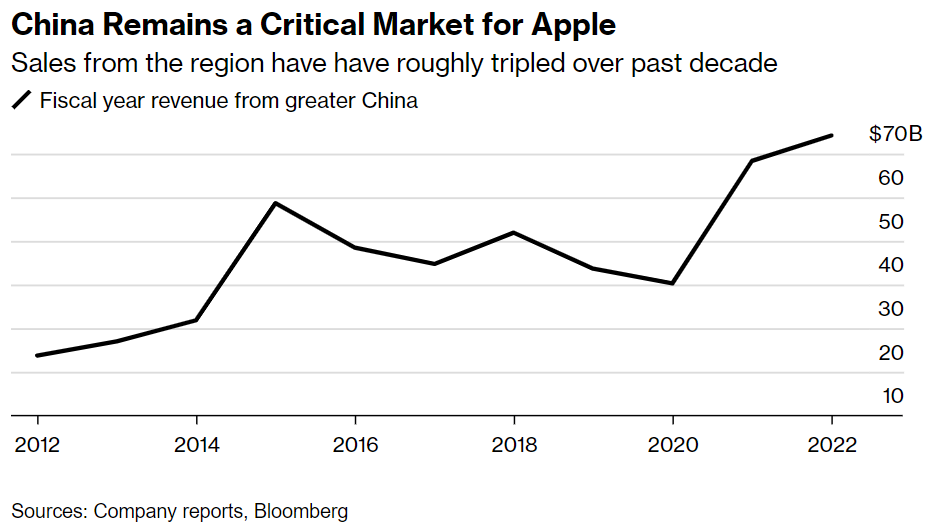
China in the second quarter of this year became the biggest iPhone market in the world, overtaking the United States for the first time in history. Source: Bloomberg
For context on how China has become such a big part of the iPhone maker’s bottom line, Apple has modified its iOS software to appease the country, such as by limiting AirDrop’s time window to 10 minutes, and, in a more geopolitically sinister act of appeasement, removing the Taiwanese flag emoji.
The WSJ also reported that managers have notified staff of the ban via chat groups or meetings. Separately, a source who regularly deals with Chinese central government agencies told CNN that officials in China had already been following an unwritten rule of shunning iPhones even before the pandemic, despite the apparent absence of a formal policy.
According to sources, central government officials now tend to use smartphones made by major domestic companies, especially Huawei. Bloomberg also reported that Beijing intends to extend that restriction far more broadly, to many state-owned enterprises and other government-controlled organizations.
“If Beijing goes ahead, the unprecedented blockade will culminate a yearslong effort to root out foreign technology used in sensitive environments, coinciding with Beijing’s effort to reduce its reliance on American software and circuitry. It threatens to erode Apple’s position in a market that yields roughly a fifth of its revenue, and from where it makes the majority of the world’s iPhones through sprawling factories that employ millions of Chinese,” Bloomberg’s report reads.
Is China changing its stance on Apple?
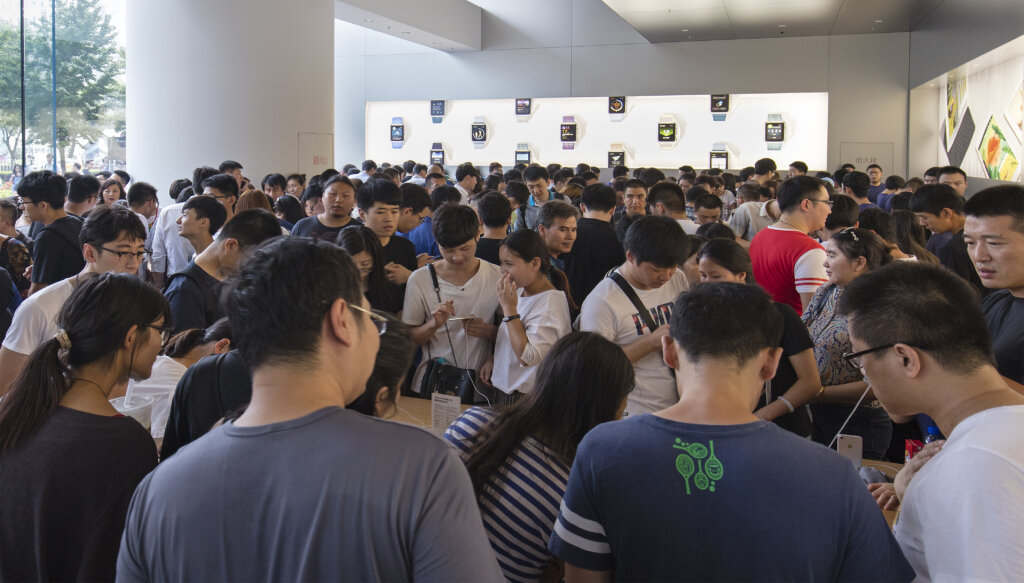
People crowd an Apple Store in Xidan commercial area. Source: Shutterstock
Considering Apple’s relationship with Beijing and its importance to the economy, it “has historically been viewed as relatively safe in China from government restrictions,” said KeyBanc Capital Markets analyst Brandon Nispel in a report on Wednesday. “Is the government changing its stance?”
Maybe. But despite rising resentment of American efforts to contain China’s rise in technological prowess, Apple enjoys widespread popularity in China. In fact, iPhones are among the bestsellers in China and are common in both government and private sectors. China was also a highlight of Apple’s results last quarter, helping offset a sluggish period.
If Beijing decides to play hardball on Apple’s bestselling product, the iPhone 15 and the Huawei Mate 60 Pro could become avatars of a trade war that only seems to be getting colder and more implacable over time.
Is China preparing to fight U.S. fire with fire?
READ MORE
- Safer Automation: How Sophic and Firmus Succeeded in Malaysia with MDEC’s Support
- Privilege granted, not gained: Intelligent authorization for enhanced infrastructure productivity
- Low-Code produces the Proof-of-Possibilities
- New Wearables Enable Staff to Work Faster and Safer
- Experts weigh in on Oracle’s departure from adland

